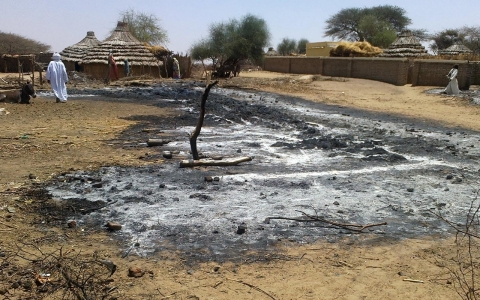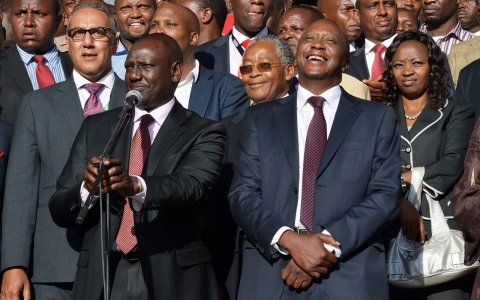Sudanese President Omar al-Bashir arrived back in Khartoum on Monday after being spirited out of South Africa in defiance of a Pretoria court ruling that he be kept in the country pending a hearing over his potential arrest on international charge of genocide.
Bashir was greeted by cheers as he stepped out of a plane in Sudan's capital. He had been in Johannesburg for an Africa Union (AU) summit Sunday when a judge ordered authorities to prevent him from exiting the country until a court session the following morning. The Sudanese leader, who took power in a 1989 coup, is wanted by the International Criminal Court (ICC) over allegations of human rights abuses relating to the conflict in Darfur, in which around 300,000 people were killed and 2 million displaced, according to United Nations figures. Bashir denies the charges.
Sudan's information minister had earlier told Al Jazeera that Bashir exited South Africa airspace, pre-empting any court decision. Judges hearing the application to arrest the Sudanese president said they were "concerned" that state officials had disobeyed the court order that he be barred from leaving.
The ICC had warned that South Africa was under legal obligation to arrest Bashir and surrender him to the international court, based in The Hague, Netherlands. Accordingly, South African Judge Hans Fabricius ordered authorities in the country to bar the Sudanese president from leaving, pending Monday’s hearing.
But Information Minister Ahmed Bilal Osman told Al Jazeera prior to the court session that the judge has no ability to enforce such an order.
“The judiciary ... does not have policemen. The president is there [in South Africa], and no one is going to arrest him.”
After Bashir was spirited out of the country, the ICC commented that it had been"very clear" in its assessment that South Africa should have detained the Sudanese leader.
"Their obligation was to arrest President al-Bashir," ICC deputy prosecutor James Stewart told the Associated Press.
The South African judge’s interim order was made by the high court in Pretoria following an application from civil society organization.
State lawyers were due to have started legal arguments in the case at around 10 a.m. local time. The high court would have had to decide whether to send Bashir to the International Criminal Court in accordance with The Hague’s request.
In a statement late Sunday, the U.S. State Department called on the “Government of South Africa to support the international community's efforts to provide justice for the victims of these heinous crimes.”
Kamal Ismail, Sudan’s state minister for foreign affairs, said Khartoum received assurances prior to Bashir’s visit that he would be welcomed and allowed to leave.
And South Africa’s ruling African National Congress has said that the government granted immunity “for all (summit) participants as part of the international norms for countries hosting such gathering of the AU or even the United Nations.”
Even before Sunday's events, the African Union had asked the ICC to stop proceedings against sitting presidents and said it will not compel any member states to arrest a leader on behalf of the court.
Bashir has traveled to other ICC member states before. Visits becoming the first sitting president to be indicted by the court in 2009, he has visited Malawi, Kenya, Chad and Congo in the last few years — all signatories to the Hague-based institution. The court doesn't have any powers to compel countries to arrest him and can only tell them they have a legal obligation to do it.
Al Jazeera and wire services

Understanding the janjaweed militias’ intent to destroy is key to international action on Sudan

Kenya trials key to future of court’s relations with continent

Credibility of international tribunal, already in doubt, has reached an all-time low






Error
Sorry, your comment was not saved due to a technical problem. Please try again later or using a different browser.